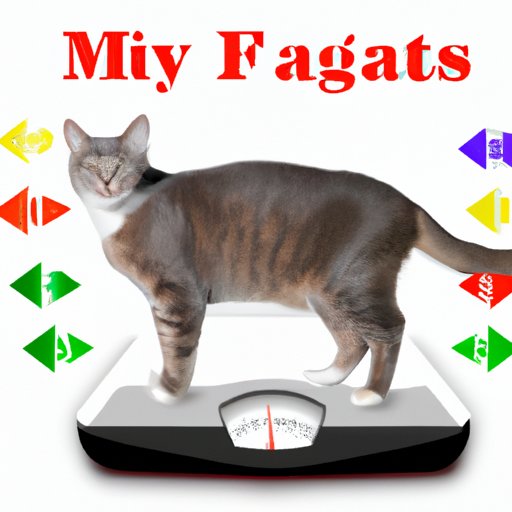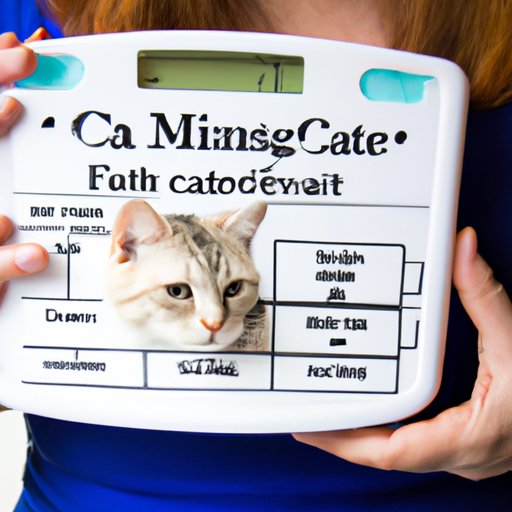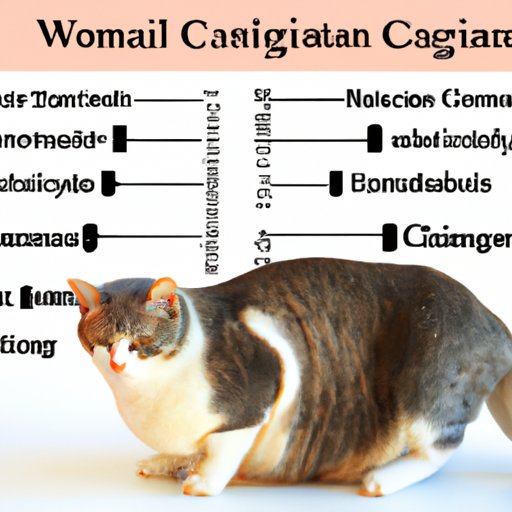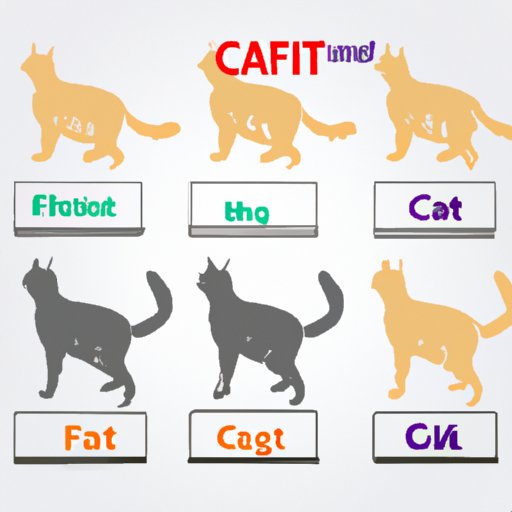Introduction
Cats are beloved companions that bring joy and love into our lives. As cat owners, it’s important to provide the best care possible for our furry friends, which includes understanding their ideal weight and providing the right nutrition to help them maintain a healthy weight. But what exactly is a healthy weight for a cat?

Definition of a Healthy Weight for Cats
A healthy weight for cats is based on a variety of factors, including breed, age, gender, and activity level. Generally speaking, a cat is considered to have an ideal body weight when its body condition score is between 4 and 5 out of 9 points. A body condition score of 4 or 5 indicates the cat has a good amount of muscle and fat reserves and is not overweight or underweight.
Overview of the Importance of Maintaining a Healthy Weight for Cats
Maintaining a healthy weight for cats is essential for ensuring their overall health and well-being. Studies have shown that overweight cats are more likely to suffer from chronic illnesses such as diabetes, heart disease, and kidney disease. Keeping cats at a healthy weight can also improve their quality of life and increase their lifespan. As noted by Dr. Tony Buffington, a professor at The Ohio State University College of Veterinary Medicine, “Even small amounts of weight loss can lead to measurable improvements in a cat’s quality of life, so it’s worth the effort.”

Examining the Average Weight of Cats and How to Determine if a Cat is at a Healthy Weight
The average weight of cats varies depending on their size and breed. Smaller breeds typically weigh between 3 and 6 kilograms (6.5 to 13 pounds) while larger breeds typically weigh between 4 and 8 kilograms (8.5 to 18 pounds). However, there are some exceptions; for example, Maine Coons are considered a large breed but can weigh up to 10 kilograms (22 pounds).
There are several factors that can influence a cat’s ideal weight, such as age, gender, and activity level. In general, kittens tend to be lighter than adult cats, while male cats tend to be heavier than female cats. Additionally, cats that are more active tend to have a lower body weight than those who are less active.
It’s important to note that cats come in all shapes and sizes, so it’s not always easy to determine if a cat is at a healthy weight. However, there are some guidelines that can help. One of the most effective ways to determine if a cat is at a healthy weight is to use a body condition score system. This system uses a scale of 1 to 9, with 1 being severely underweight and 9 being severely overweight. A score of 4 or 5 indicates the cat has a good amount of muscle and fat reserves and is not overweight or underweight.
Exploring the Benefits of Keeping a Cat at a Healthy Weight
Keeping cats at a healthy weight comes with numerous benefits. For starters, it can help improve their physical health. Cats that are at a healthy weight are less likely to suffer from obesity-related conditions such as arthritis, joint pain, and breathing difficulties. Additionally, cats that are at a healthy weight may have improved mobility and energy levels.
Maintaining a healthy weight can also help cats live longer. According to a study published in the Journal of Veterinary Internal Medicine, overweight cats had a significantly shorter lifespan than cats that were at a healthy weight. The study found that cats that were overweight had an average lifespan of just over seven years, while cats that were at a healthy weight had an average lifespan of nearly nine years.
Finally, keeping cats at a healthy weight can help reduce the risk of certain medical conditions. Overweight cats are more prone to developing diabetes, heart disease, and kidney disease. By maintaining a healthy weight, cats can reduce their risk of these conditions and enjoy a better quality of life.
Comparing the Different Factors That Can Affect a Cat’s Ideal Weight
When it comes to determining a cat’s ideal weight, breed, age, gender, and activity level are all important factors to consider. Here’s a closer look at each factor:
Breed
Different breeds of cats vary in size and weight. For example, Siamese cats tend to be smaller than Persian cats, and Ragdolls tend to be larger than Bengal cats. It’s important to research the average weight of your cat’s breed to get an idea of what a healthy weight should be.
Age
Kittens tend to be much lighter than adult cats, so it’s important to take age into consideration when determining a cat’s ideal weight. Kittens should be weighed regularly to make sure they are gaining weight at a healthy rate.
Gender
Male cats tend to be heavier than female cats, so it’s important to pay attention to gender when assessing a cat’s weight. Female cats that are spayed tend to gain weight more easily, so it’s important to be extra vigilant when monitoring their weight.
Activity Level
Cats that are more active tend to have a lower body weight than those who are less active. Providing opportunities for play and exercise can help cats stay at a healthy weight.
Outlining a Cat’s Nutritional Needs for Maintaining a Healthy Weight
Providing the proper nutrition is essential for helping cats maintain a healthy weight. It’s important to feed cats a high-quality diet that is formulated for their specific needs. Wet food is generally better for cats than dry food, as it contains more moisture and is closer to a cat’s natural diet. When it comes to the amount of food to feed your cat, it’s important to follow the feeding instructions on the food package. Most cats require about 20 calories per pound of body weight per day.
In some cases, cats may need additional supplementation. Cats that are pregnant or nursing may require additional nutrients, while cats that are elderly or suffering from certain medical conditions may need special diets. It’s important to talk to your veterinarian to determine if your cat needs any additional supplementation.

Addressing Common Health Risks Associated with Being Overweight or Underweight in Cats
Being overweight or underweight can be dangerous for cats, as it can lead to a variety of health problems. Here’s a closer look at the health risks associated with being overweight or underweight in cats:
Risks Associated with Being Overweight
Overweight cats are more prone to developing obesity-related conditions such as diabetes, heart disease, and breathing difficulties. They are also more likely to suffer from joint pain and arthritis due to the strain of carrying extra weight.
Risks Associated with Being Underweight
Underweight cats may suffer from malnutrition, which can lead to a weakened immune system and increased risk of infection. Additionally, underweight cats may struggle to gain weight due to poor appetite, malabsorption, or digestive issues.
Understanding How to Monitor Your Cat’s Weight and Make Necessary Adjustments
Monitoring your cat’s weight is essential for ensuring they are at a healthy weight. The best way to do this is to weigh your cat regularly and compare the results to the average weight range for their breed. If your cat is outside of the recommended weight range, you may need to make adjustments to their diet and lifestyle.
If your cat is overweight, you may need to cut back on treats and switch to a low-calorie diet. You should also provide opportunities for play and exercise to help your cat burn off excess calories. If your cat is underweight, you may need to increase their calorie intake and add in supplements, such as omega-3 fatty acids and probiotics, to boost their nutritional intake.
Conclusion
Cats are wonderful companions that bring joy and love into our lives. Keeping cats at a healthy weight is essential for ensuring their overall health and well-being. It’s important to understand what a healthy weight is for cats, as well as the different factors that can influence their ideal weight. Additionally, it’s important to provide the right nutrition and monitor their weight regularly to ensure they remain at a healthy weight. With the right care and attention, cats can enjoy a long and happy life.
(Note: Is this article not meeting your expectations? Do you have knowledge or insights to share? Unlock new opportunities and expand your reach by joining our authors team. Click Registration to join us and share your expertise with our readers.)
